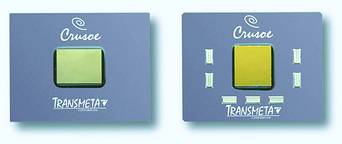

Transmeta Corporation has ended four and a half years of secrecy with the introduction of Crusoe, the world's first family of smart microprocessors. Designed to create a new category of mobile Internet computers, the Crusoe processor family is based on a breakthrough software approach claimed to revolutionise the field of mobile computing.
The evolving class of mobile Internet computers share the common need of x86 software compatibility and long battery life. Offering greater mobility and access to the Web from almost anywhere at anytime, Transmeta says ultra-light mobile PCs operating with the Windows operating system and Microsoft Office applications can take advantage of the Crusoe processor's low power to increase the average user's productivity by operating on a single battery for up to a full work day.
Re-thinking the microprocessor
In a radical departure from traditional microprocessor design, Transmeta made innovative use of software to implement many functions that had previously been implemented in hardware. This approach gives Crusoe both high performance and low power advantages.
The key to Crusoe's unique architecture is its Code Morphing software, says Transmeta. Code Morphing software surrounds a simple very long instruction word (VLIW) silicon engine to deliver a fully PC compatible processor. It is this software that provides the compatibility by 'morphing' (ie translating x86 instructions) to the underlying hardware engine.
Crusoe is a smart processor that 'learns' about an application while it runs and uses that experience to greatly extend battery life. Using the new Transmeta invention called LongRun power management, Crusoe continuously adjusts its operating speed and voltage to exactly match the needs of the application workload. LongRun can make adjustments hundreds of times per second, which can dramatically extend battery life, claims the company. This is in contrast to other processors that run at a fixed operating speed on batteries, needlessly wasting battery life.
LongRun also provides a solution for today's strenuous multimedia applications that typically drain an ultra-light PC's battery in as little as an hour. With LongRun, it is possible to design a light-weight mobile PC that plays a DVD movie for three hours or more, says Transmeta.
"We rethought the microprocessor from the ground-up," said Transmeta CEO Dave Ditzel. "Crusoe is the first processor to deliver all three of the key requirements for mobile Internet computing: low power, high performance and full PC compatibility."
Also the founder of the company, Ditzel previously designed chips for Sun Microsystems and AT&T Bell Laboratories. Behind the project are 200 employees in California, as well as in Taiwan and Japan, including superstar designers like Linux creator Linus Torvalds. Investors consist of industry barons like Microsoft co-founder Paul Allen and billionaire financier George Soros.
According to the company, Crusoe-based Internet devices such as Web pads and mobile clients can take advantage of the Mobile Linux operating system to create a robust yet economical machine that can handle all the required Internet plug-in applications. Mobile Linux offers an additional advantage in that it is an operating system that can be stored in solid state Flash ROM thus removing the need for an expensive hard disk drive.
Commenting on the current state of the mobile market, analyst Martin Reynolds of the market research firm Dataquest, concurs with the need for a new mobile processor. "When people build mobile computers today, they use what is basically a desktop processor in a different package," he said. "There's definitely room for a fresh approach."
The postage stamp-sized processors sell for between $65 for a 333 MHz model to $329 for a 700 MHz model. Those prices mean the processors can be used in small computers that will eventually cost consumers between $500 and $2500, according to Transmeta.
One of those devices that will use the Transmeta chip is a Web pad made by S3. The pad, about the size of a book, is a Linux-based Internet appliance that users can carry with them to surf the Web, download music or stream live video. There is a slot in the pad for a modem so that users do not have to be plugged into a wall to use the system. According to sources at S3 the pads should sell for less than $1000 and should be available before the end of the year.
For further information see www.crusoe.com

© Technews Publishing (Pty) Ltd | All Rights Reserved